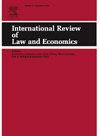竞争与隐私的两个边缘
IF 1
3区 社会学
Q3 ECONOMICS
引用次数: 0
摘要
本文分析了隐私保护与市场竞争的关系。我们考虑了一个模型,在这个模型中,公司收集数据来对竞争产品市场中的消费者进行价格歧视,我们区分了两种隐私边际。公司战略性地选择他们收集数据的消费者数量——广泛的隐私边际——以及信息的精确度——隐私的密集边际。研究表明,政策制定者可以通过保护集约化边际来有效地保护隐私边际和消费者剩余边际。事实上,当这两个战略变量互为战略补充时,限制公司对每个消费者的信息量(密集边际)也会促使公司收集更少消费者的数据,从而保护广泛的隐私边际。这软化了竞争的强度,但也减少了公司的租金提取,总消费者剩余增加。当两个变量互为战略替代时,保护集约边际损害了粗放边际的隐私,但仍增加了消费者剩余。本文章由计算机程序翻译,如有差异,请以英文原文为准。
Competition and the two margins of privacy
This article analyzes the relationship between privacy protection and market competition. We consider a model where firms collect data to price discriminate consumers in a competitive product market, and we distinguish two margins of privacy. Firms strategically choose the number of consumers on whom they collect data – the extensive margin of privacy – as well as the precision of information – the intensive margin of privacy. We show that policymakers can efficiently protect both margins of privacy and consumer surplus by safeguarding the intensive margin. Indeed, when both strategic variables are strategic complements, restricting the amount of information that firms have on each consumer (the intensive margin) also induces firms to collect data on fewer consumers, thereby protecting the extensive margin of privacy. This softens the intensity of competition but also reduces rent extraction by firms, and total consumer surplus increases. When both variables are strategic substitutes, protecting the intensive margin harms privacy at the extensive margin, but still increases consumer surplus.
求助全文
通过发布文献求助,成功后即可免费获取论文全文。
去求助
来源期刊
CiteScore
2.60
自引率
18.20%
发文量
38
审稿时长
48 days
期刊介绍:
The International Review of Law and Economics provides a forum for interdisciplinary research at the interface of law and economics. IRLE is international in scope and audience and particularly welcomes both theoretical and empirical papers on comparative law and economics, globalization and legal harmonization, and the endogenous emergence of legal institutions, in addition to more traditional legal topics.

 求助内容:
求助内容: 应助结果提醒方式:
应助结果提醒方式:


